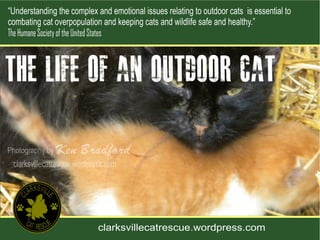The Life of an Outdoor Cat
- 2. Outdoor cats are found in every neighborhood. These cats include community cats: ‚óè Friendly stray cats ‚óè Abandoned cats ‚óè Unsocialized cats (feral) ‚óè Owned cats let outside to roam and reproduce
- 3. Being un-neutered is a hard life for cats living outdoors.
- 4. Mating is a call of nature but not a pleasant experience for the female.
- 5. When she has kittens, she must find a nesting place that is safe and warm to protect her young kittens from the elements and predators (raccoons and other wildlife that will eat the kittens, and tom cats that will sometimes kill them).
- 6. The nest must be near a reliable food source to keep her and the kittens healthy. Many don't find that reliable source. Ever vigilant, she is under pressure to snatch her food quickly and get back to her babies to protect them.
- 7. She will often protect her babies with her life and she suffers grief when she loses them.
- 8. Male cats grow up to be a slave to their hormones.
- 9. They fight for territory. They fight for the females in heat and they fight for food.
- 10. It is a sad, hard life where they often end up contracting diseases from other males, causing their lives to end painfully.
- 11. From fighting they get abscesses and torn ears. They mark their territory by spraying and they are stinky!
- 12. All this could be avoided simply by spaying or neutering the cats!
- 14. As the weather continues to get warmer, we are fast approaching what we call “the kitten season”. For the past two years we have been trying to help improve the lives of stray and feral cats and reduce the cat overpopulation problem in Clarksville and Montgomery County by getting involved in a Trap-Neuter-Return (TNR) program.
- 15. TNR is the method of humanely trapping community cats, having them spayed or neutered and vaccinated against rabies, and then returning them to their colony to live out their lives. TNR also involves a colony caretaker who provides food and adequate shelter and monitors the cats’ health. TNR has been shown to be the least costly and the most humane, efficient way of stabilizing community cat populations.
- 16. TNR helps stabilize the population of community colonies and, over time, reduces them. Nuisance behaviors such as spraying, excessive noisemaking and fighting are largely eliminated and no additional kittens are born.
- 17. While we are already making progress in our own neighborhood, we need your help to institute other TNR programs around Clarksville and Montgomery County.
- 18. You can help with ongoing needs including feeding, trapping, transportation to and from the veterinarian, temporary housing for cats after surgery, and fostering and socializing kittens for the purpose of finding them good forever homes.
- 19. Your support is key in solving this problem.
- 20. Would you consider donating $5.00 to help us achieve our mission?
- 21. You can make your donation through PayPal on our website or through our Clarksville Cat Rescue Go Fund Me account.
- 22. Your donation is greatly appreciated and will be used to help reduce feral cat overpopulation, improve the cats’ lives, protect our wildlife and make our communities better.
- 23. 1880 Garwood Dr. Clarksville, TN 37040 Phone: 931-217-0572 E-mail: feralcats@charter.net Web:clarksvillecatrescue.wordpress.com























